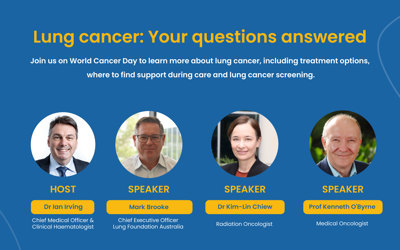
Icon Cancer Centre Facebook Live: Lung Cancer
Cancer is a word that brings fear to many people, and you’ll often hear of people being diagnosed asymptomatic. This means that the cancer has developed in a part of the body which has no symptoms, or symptoms are not felt at the time.
Someone with cancer doesn’t have to have symptoms. If you have asymptomatic cancer, you might only find out when an X-ray or other diagnostic test reveals the problem.
Be more informed and play an active role in your own cancer care.

Some symptoms of cancer can be vague and can be easily mistaken for other health conditions. Also, you might only notice symptoms at the later stage of development when the cancer starts to affect other parts of the body.
Because of cancer’s ability to “hide in plain sight”, it’s important to keep up with recommended cancer screening tests, which can detect cancers at a very early stage, even before they’ve caused any obvious symptoms.
The signs and symptoms of cancer are varied and can range from mild to severe. The most common symptom is a lump, which may be felt or seen on the body; however, this isn’t always the case.
• Unexplained pain that doesn’t go away
• Changes in bowel or bladder habits
• Weight loss or gain for no known reason
• Persistent sore throat or cough
• Unexplained bleeding or blood
• Headaches or blurred vision
• Fatigue
• Dizziness and nausea
• A sore or skin growth that is slow to heal or changes in size and shape
• Breast changes
There are many types of cancer that can grow in the body without causing noticeable symptoms. These are sometimes called silent cancers. The cancers that can be the most difficult to detect at an early stage are:
While some people with lung cancer do experience symptoms, these can be nonspecific and could be dismissed as other conditions such as asthma or bronchitis. As a result, lung cancers are often diagnosed at an advanced stage when they have already spread beyond the lungs.
Brain cancer can be difficult to detect because it can take various forms. Symptoms are often vague and nonspecific.
Cervical cancer is often asymptomatic until it reaches Stage 2 or 3, which can make early detection difficult.
Early-stage pancreatic cancer is unlikely to cause any signs or symptoms, which is why it is often only diagnosed after it has reached an advanced state.
Colorectal (or bowel) cancer can be hard to detect in the early stages, which is why we have a screening program in Australia to detect the cancer early or to detect and remove pre-cancerous colonic polyps.
Sometimes called the silent killer, ovarian cancer symptoms can be very non-specific and like other common conditions.
Thyroid cancers cause symptoms such as a lump or pain in the throat / neck area, however many are asymptomatic.
While some cancers grow very quickly, other cancers are very slow growing and can even go undetected for ten years or more. One example is certain types of thyroid cancer, which are very slow growing and may never spread beyond the thyroid gland.
If you receive a cancer diagnosis, we are here to help. You can find out how to become a patient at Icon Cancer Centre or request more information from your nearest centre.
The content on the Icon Cancer Centre website is for informational purposes only and should not be considered medical advice. It is not a substitute for consultation with a qualified medical practitioner. For personalised medical guidance, please consult with your GP or another qualified healthcare provider.

Discover our comprehensive collection of content designed to inform, support, and guide you through every aspect of cancer care. From the latest news and updates to personal patient experiences and educational resources, these materials provide valuable insights to help you better understand cancer, treatment options, and the journey ahead.